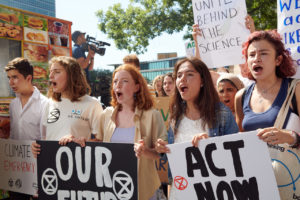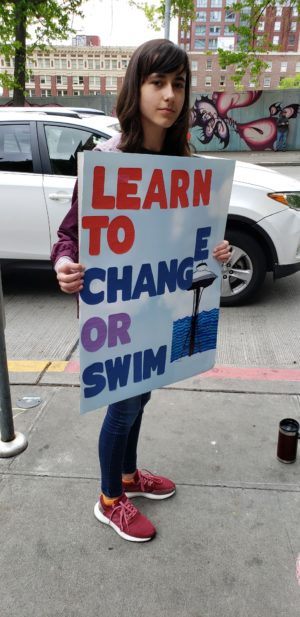On Friday, September 20th, millions of people from around the world will walk out of their schools, workplaces and homes to join the youth-led Global Climate Strike and demand action on climate change and justice for everyone. After multiple reports highlighting the dire situation facing our planet and wildlife, one thing has become abundantly clear: our younger generation deserves to be heard. The National Wildlife Federation stands in solidarity with global youth to deliver this important message.
Greta Thunberg, a Swedish teen who started the Fridays For Future movement to urge her government to fight climate change, has inspired a generation to demand adults and their governments act on climate at the scale and speed the science tells us is necessary. National Wildlife Federation is joining with many other adult-led organizations to support the U.S. Climate Strikes and other youth leaders like Greta nationwide. We are joining strikers in cities across the nation – including New York City, Washington D.C., Seattle, St. Paul, Missoula, Tampa, and Houston – and working with schools and youth-led events in communities throughout the country.
You can RSVP to join the strike closest to you – and we hope to see you marching with us. But if there isn’t a strike in a city near you, or you are unable to join a strike event, there are many ways to show your support and take action. You can make sure that wildlife still have a voice by adding your name in support of the youth-led climate strike.
National Wildlife Federation Stands With Students
The National Wildlife Federation and our Eco-Schools USA program are proud to stand in solidarity with youth and student leaders across the country in calling for climate action.
We value education and time spent in the classroom as well as civic engagement in important issues. The climate crisis will disproportionately affect both wildlife and vulnerable human communities – including low income communities, communities of color, and young children and the elderly. We need decisive action right now to both prevent climate change from exacerbating out of human control, and to increase the resilience of these most vulnerable communities to climate impacts like drought, flooding, natural disasters, poor air and water quality, and heat-related illnesses.
We encourage teachers, students, and others to participate this Friday and in future climate strikes, as long as student action and participation is safe and supported by school administrators, staff, and parents. Our nation’s largest school district, New York City Public Schools, has shown its support for the strike as well by announcing that they will excuse the absence of any of its 1.1 million students to attend the strike, if they have a note from their parents. Many other schools districts are supporting students and teachers alike by assigning no homework before or after the strike, fostering classroom discussions and assemblies and implementing environmental service projects.
And many administrators and teachers espouse the value of civic engagement in the education of their students. “Creating opportunities for students to learn about the world around them and apply this learning to solving authentic problems in their daily lives, as engaged citizens advocating for community resilience to climate change, builds a STEM literate population for the future,” says Lisa V. Milenkovic, Ph.D., the STEM and Computer Science Supervisor for Broward County Public Schools.
National Wildlife Federation provides curricula and learning opportunities to build climate literacy, engage students in civic activities and conservation projects, and empower them to take an active role in shaping a more sustainable and climate resilient future.
Many of the youth leaders around the country have experienced the effects of climate change first hand:
“In Lerma, [Mexico], the rainfall of 2015 flooded my town, new factories contaminated the air, and buildings were sinking into wetlands. Economic instability and air pollution were the things that pushed my family out of my home. When moving to New York, I realized that the climate catastrophe follows you. It is the one issue that affects everyone, everywhere, but it’s affecting marginalized communities the most. This crisis is our present, but we cannot let it be our future. That’s why youth across the globe are uniting against corporate power, against climate racism, and against the deterioration of mother earth.”- Xiye Bastida, New York
They understand the science:
“The scie nce is telling us that by the end of this century, Seattle and most other coastal lands will be almost completely underwater. That’s terrifying for a teen to hear. What’s more terrifying is knowing that before that, we will be facing many other climate catastrophes — extreme heat, fire, drought, hunger, ‘natural’ disasters, air pollution, and so much more. That is, if we don’t act now. This is why I want to empower fellow youth (adults, too!) and show them that we can all stand up to those in power and tell them that we deserve to have a livable future. Our generation has so much more to say.” – Maria Suchoski, Seattle
nce is telling us that by the end of this century, Seattle and most other coastal lands will be almost completely underwater. That’s terrifying for a teen to hear. What’s more terrifying is knowing that before that, we will be facing many other climate catastrophes — extreme heat, fire, drought, hunger, ‘natural’ disasters, air pollution, and so much more. That is, if we don’t act now. This is why I want to empower fellow youth (adults, too!) and show them that we can all stand up to those in power and tell them that we deserve to have a livable future. Our generation has so much more to say.” – Maria Suchoski, Seattle
Why you should participate:
“A year ago, I never would have imagined identifying as a ‘climate activist.’ But in a world where good news is scarce and youth voices get drowned by polluters, activism is a way for us to make ourselves heard.
…Organizing and protesting gives me hope. I’ve watched over the last few months as youth across the globe have rallied around the common goal of justice. And not only that, but direct action works – we’re seeing results as countries begin to take climate action.
However, we still have a long way to go, which is why we’re asking everyone, no matter how old you are or where you come from, to join our strike on September 20th. Because to win this fight we must be united – will you join us?” – Sophie Anderson, New York

